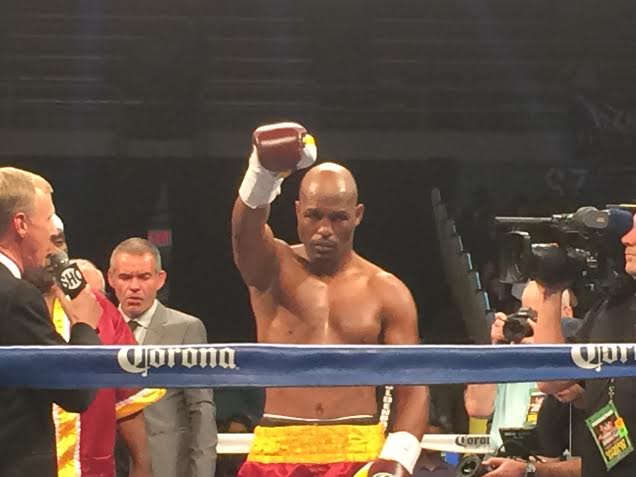Bernard Hopkins insists that the media doesn’t cover his late-career accomplishments “because I’m black.” He’s half right–but for the wrong reasons.
The 49-year-old light-heavyweight titlist told ESPN that if he were white with an ethnic surname, “I’d be on every billboard and every milk carton and every place to be. [It’s the] only solution I can come up with if we’re talking ‘American Dream.’ Here’s a guy who almost threw his life away and he took this great country’s attributes and used it–do for self, work hard, be a law-abiding citizen. I’ve done that for 26 years. If you really look at it, I’ve done the ‘American Dream’ that people have died on boats to come here to live.”
Indeed, Hopkins, a project kid paroled from jail in 1988, eschews alcohol and drugs, remains husband to the same woman he married more than twenty years ago, and boasts a reputation for frugality in a profession of profligates. The teenaged armed robber appears as a punching poster-child for parole, a shining example of criminal-justice-system rehabilitation rather than recidivism, a role model for boxers outside of the ring as much as inside of it.
And he surely deserves more attention for his late-career accomplishments. The Benjamin Button boxer ranks as the best old-man fighter in the history of the sport, defeating reigning middleweight champion Kelly Pavlik, light heavyweight titlist Jean Pascal, and all-time greats Winky Wright, Antonio Tarver, and Roy Jones Jr. all after turning 40-years-old. Archie Moore, Roberto Duran, and even George Foreman couldn’t accomplish post-40 what the ageless alien has. To call the guy who will make the walk from Boardwalk Hall’s dressing room to the ring on Saturday night “Satchel Paige in a bathrobe” sells him short. He’s not merely in the big leagues. Hopkins plays at an all-star level as he approaches 50.

So why does BHop make Bernard Hopkins money instead of Oscar De La Hoya paydays? Could the same country that threw money at Muhammad Ali, Ray Leonard, Mike Tyson, and Floyd Mayweather really withhold dollars from Bernard Hopkins because of his skin color?
The Philadelphia fighter’s inflammatory accusation contains a grain of truth (explanation to come). But Bernard Hopkins, not the media or the casino hotshots sitting ringside, hold back Bernard Hopkins most.
Hopkins making a grand entrance during his prime in an executioner’s mask seemed almost designed to turn off crowds–and not just ones in Graterford State Penitentiary. Predicting the death of adversaries in the ring conjured up the most off-putting aspect of his controversial sport (his opponent this weekend, Sergey Kovalev, killed an opponent four years ago). Stomping on the Puerto Rican flag in the lead up to his signature win over Felix Trinidad and vowing before Joe Calzaghe bested him never to lose to a “white boy” also alienated the ticket-buying public. Although the punchline about men acting as their own attorneys doesn’t neatly apply to boxers serving as their own promoters given the landscape of Don Kings and Bob Arums, Hopkins employing himself as his own hype man likely hurt his marketability, too. But Bernard Hopkins’s biggest offense remains his defense.
Bernard Hopkins is what Bernard Hopkins would call a “black boxer.” “[Joshua] Clottey is ‘black,'” he noted four years ago of a Manny Pacquiao foe, “but not a ‘black boxer’ from the states with a slick style.” He argued that such fighters embodying the African-American style, a la Sugar Ray Leonard or Floyd Mayweather, would negate the heavy-handed Filipino. In the sense Hopkins uses the phrase, white guy Paulie Malignaggi and Mexican Miguel Vazquez might be considered “black boxers,” too.
Whereas “black” prefixing “quarterback” often serves as code word for “athletic,” “black” modifying “boxer” translates as “cerebral.” Not getting hit, rather than seeking the consciousness-alleviating wallop, characterizes the “black boxer.” Alas, casual fans don’t dole out hundreds of dollars for a ticket, or $60 for a pay-per view, to watch big misses. They pay to see big hits.

The “style” Hopkins insists remains “embedded in most of us black fighters” frustrates fans as well as opponents. So does the jab-and-grab late addition to his repertoire that no racial group dares attach their name to. The light-heavyweight titlist exhibits a propensity to employ the vexing shoulder roll, to play the patient counter puncher, to use feints, angles, and distance against his opponent. He never brawls, always boxes. He’s Wade Boggs wearing down a pitcher, not Mark McGwire sending him to the showers in one swing. One has to think of boxing more as sweet science than prize fighting to appreciate Bernard Hopkins.
The memory that lingers most from watching Hopkins pick apart William Joppy live in Atlantic City’s beautiful Boardwalk Hall a decade ago involves the prize-fighting crowd–not so crowded by the final bell–booing the boxing clinic. Watching Hopkins do the same in March to Beibut Shumenov in the not-so-beautiful DC Armory, the crowd, which had apparently matured with the fighter, cheered the marvel. The “black boxer” isn’t for everyone.

COMMENTS
Please let us know if you're having issues with commenting.